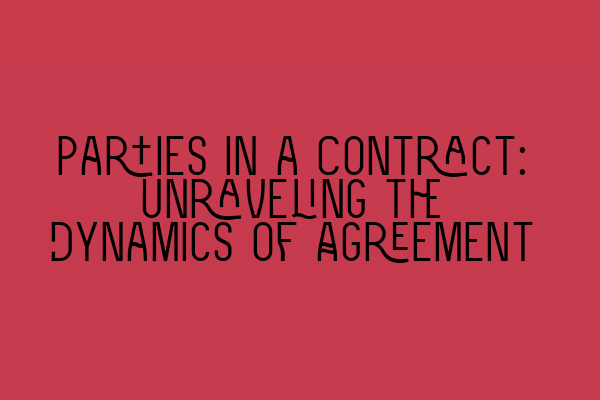Parties in a Contract: Unraveling the Dynamics of Agreement
Welcome to another engaging article by SQE Contract Law, where we delve into the intricate world of contract law. In this edition, we will be unraveling the dynamics of agreement by focusing on the parties involved in a contract. Understanding the roles and responsibilities of each party is vital for ensuring the enforceability and validity of a contract.
Before we dive into the subject matter, we highly recommend reading our previous articles to gain a comprehensive understanding of contract law:
- Exploring the Impact of Frustration on Contractual Obligations: Legal Insights
- Interpreting Contractual Clauses: Unlocking the Hidden Meanings
- Legal Aspects of Business Contracts: Key Considerations for Entrepreneurs
- SQE Contract Law vs. Traditional Qualifications: A Comparative Analysis
- Agreements in Contract Law: Understanding Its Various Types
Who are the parties in a contract?
In a contract, there are generally two parties involved – the offeror and the offeree. The offeror is the party who makes the initial offer, stating the terms and conditions they are willing to enter into. On the other hand, the offeree is the party to whom the offer is made. They have the option to accept or decline the offer.
However, it’s important to note that there can also be multiple parties involved in a contract. For instance, in a business contract, there may be a buyer and a seller, as well as other stakeholders or third-party beneficiaries who may have interests in the contract.
The role of each party
Now that we’ve established who the parties in a contract are, let’s explore the roles and responsibilities of each:
1. Offeror
The offeror holds the initial power in a contract, as they are the ones setting the terms and conditions. They have the responsibility of clearly communicating their offer to the offeree, ensuring that all essential elements and requirements are specified. It’s crucial for the offeror to make a valid and clear offer to avoid any disputes or confusion in the future.
To gain a deeper understanding of how frustration can impact contractual obligations, check out our article: Exploring the Impact of Frustration on Contractual Obligations: Legal Insights.
2. Offeree
The offeree plays an integral role in contract formation. Once an offer is made, they have the choice to either accept, negotiate, or reject the offer. If the offeree accepts the offer, a legally binding agreement is formed. However, it’s important for the offeree to clearly communicate their acceptance to the offeror and comply with any specified terms and conditions.
To gain insights into interpreting contractual clauses, make sure to read our article: Interpreting Contractual Clauses: Unlocking the Hidden Meanings.
3. Third-party beneficiaries
In certain contracts, there may be third-party beneficiaries who have an interest in the agreement, even though they are not directly involved in the negotiation or formation process. These beneficiaries can enforce the terms of the contract if it benefits them. It’s important to establish the rights and obligations of third-party beneficiaries to avoid any disputes and ensure clarity in the contract.
For entrepreneurs and business owners, understanding the legal aspects of business contracts is crucial. Check out our article for key considerations: Legal Aspects of Business Contracts: Key Considerations for Entrepreneurs.
Conclusion
Parties in a contract play significant roles in establishing a legally binding agreement. It’s important for offerors to make clear and valid offers, while offerees must carefully consider and communicate their acceptance. Additionally, understanding the involvement of third-party beneficiaries is crucial for all stakeholders.
If you’re pursuing a career in contract law and want to compare SQE Contract Law with traditional qualifications, our article provides a detailed analysis: SQE Contract Law vs. Traditional Qualifications: A Comparative Analysis.
To enhance your knowledge of different types of agreements in contract law, take a look at our article: Agreements in Contract Law: Understanding Its Various Types.
We hope this article has provided you with valuable insights into the dynamics of agreement and the important role of parties in a contract. Stay tuned for our upcoming articles that will delve into various aspects of contract law!
